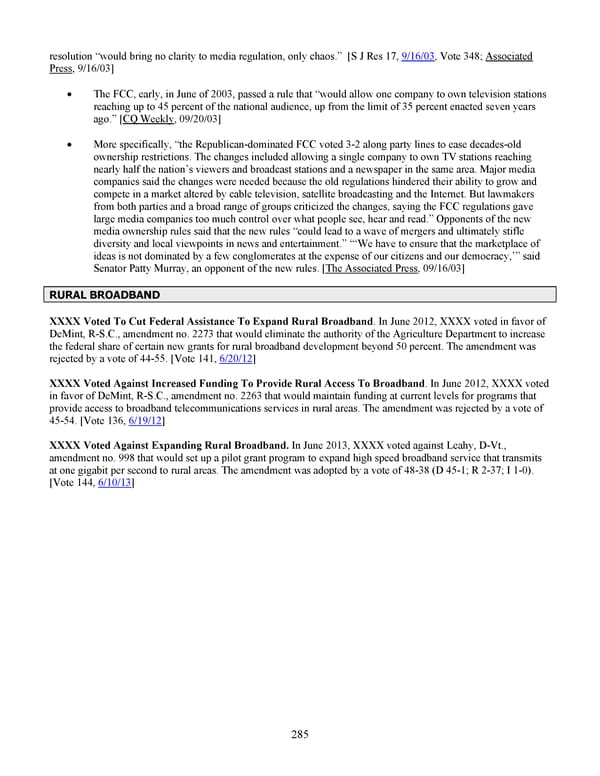resolution “would bring no clarity to media regulation, only chaos.” [S J Res 17, 9/16/03, Vote 348; Associated Press, 9/16/03] The FCC, early, in June of 2003, passed a rule that “would allow one company to own television stations reaching up to 45 percent of the national audience, up from the limit of 35 percent enacted seven years ago.” [CQ Weekly, 09/20/03] More specifically, “the Republican-dominated FCC voted 3-2 along party lines to ease decades-old ownership restrictions. The changes included allowing a single company to own TV stations reaching nearly half the nation’s viewers and broadcast stations and a newspaper in the same area. Major media companies said the changes were needed because the old regulations hindered their ability to grow and compete in a market altered by cable television, satellite broadcasting and the Internet. But lawmakers from both parties and a broad range of groups criticized the changes, saying the FCC regulations gave large media companies too much control over what people see, hear and read.” Opponents of the new media ownership rules said that the new rules “could lead to a wave of mergers and ultimately stifle diversity and local viewpoints in news and entertainment.” “‘We have to ensure that the marketplace of ideas is not dominated by a few conglomerates at the expense of our citizens and our democracy,’” said Senator Patty Murray, an opponent of the new rules. [The Associated Press, 09/16/03] RURAL BROADBAND XXXX Voted To Cut Federal Assistance To Expand Rural Broadband. In June 2012, XXXX voted in favor of DeMint, R-S.C., amendment no. 2273 that would eliminate the authority of the Agriculture Department to increase the federal share of certain new grants for rural broadband development beyond 50 percent. The amendment was rejected by a vote of 44-55. [Vote 141, 6/20/12] XXXX Voted Against Increased Funding To Provide Rural Access To Broadband. In June 2012, XXXX voted in favor of DeMint, R-S.C., amendment no. 2263 that would maintain funding at current levels for programs that provide access to broadband telecommunications services in rural areas. The amendment was rejected by a vote of 45-54. [Vote 136, 6/19/12] XXXX Voted Against Expanding Rural Broadband. In June 2013, XXXX voted against Leahy, D-Vt., amendment no. 998 that would set up a pilot grant program to expand high speed broadband service that transmits at one gigabit per second to rural areas. The amendment was adopted by a vote of 48-38 (D 45-1; R 2-37; I 1-0). [Vote 144, 6/10/13] 285
 HRC vote skeleton Page 307 Page 309
HRC vote skeleton Page 307 Page 309